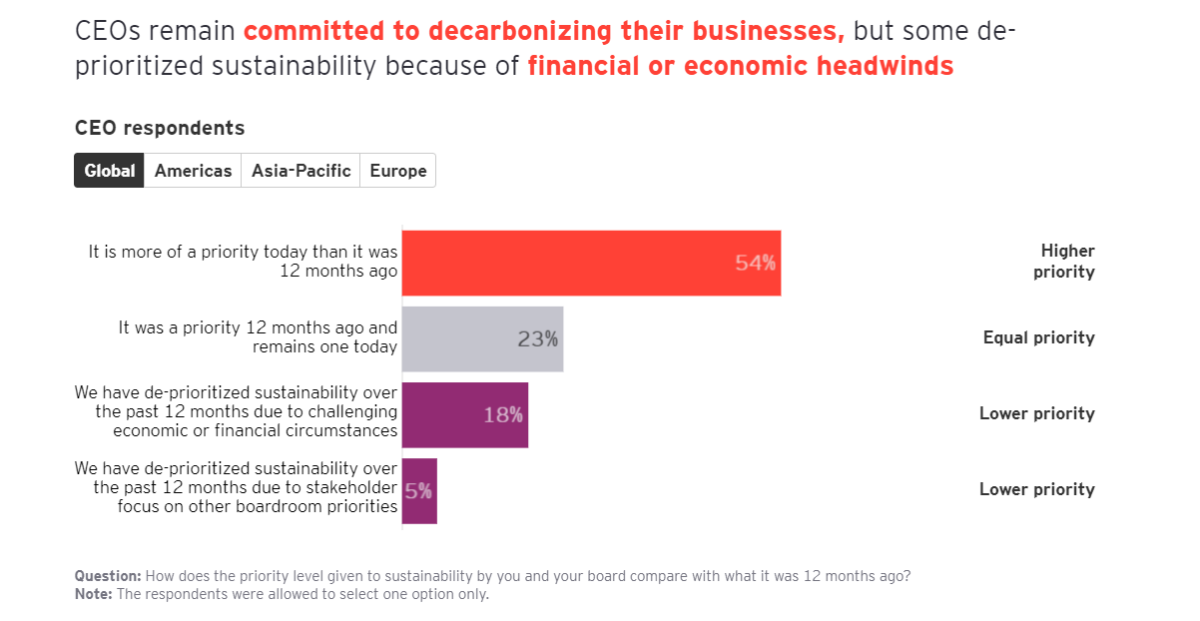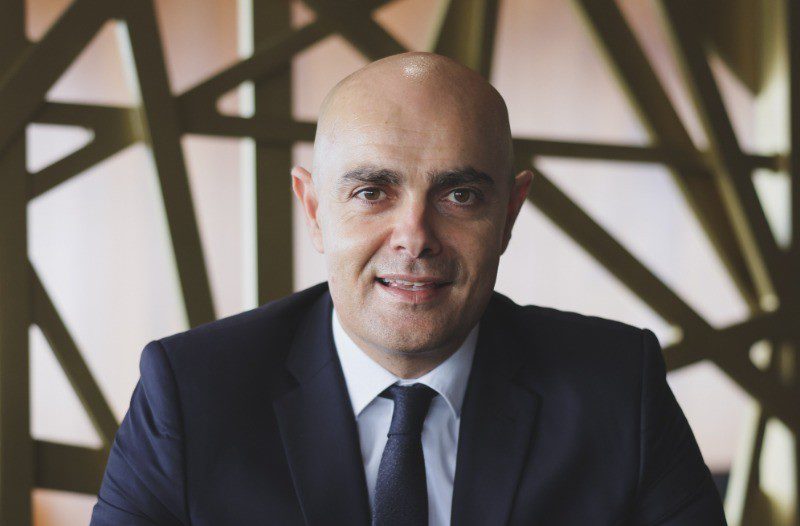More than half of global CEOs have stated that they see sustainability and climate issues as more of a priority than 12 months ago, a study from professional services firm EY has found.
In its CEO Outlook Pulse Survey for April 2024, released recently, EY surveyed 1,200 CEOs from large companies hailing from 21 countries and five industries, as well as 300 institutional investors in 21 countries.
The survey highlighted that 54 per cent of CEOs are reporting that sustainability is being given a higher priority by them and their Board of Directors than it was last year.
However, 23 per cent of respondents have deprioritised sustainability over the past 12 months, either due to challenging economic or financial circumstances, or because of stakeholder focus on other boardroom priorities. The remaining 23 per cent stated that it was a priority last year, and still is today.

Additionally, the majority (77 per cent) of CEOs agree that sustainability issues will lead to impacts to their organisations’ supply chain and ecosystem partners, while 76 per cent feel that it is crucial for governments worldwide to effectively address the effects of climate change.
75 per cent of respondents affirmed that they feel that artificial intelligence (AI) and other emerging technologies “hold the answers” to many of the key sustainability challenges faced.
Strikingly, 75 per cent regard sustainability primarily as a compliance and reporting issue. This perception has been criticised by business leaders working in the environment, social, and governance (ESG) space in the past, with them stating that businesses should approach ESG in a way that goes beyond merely fulfilling regulations, as one must also assess the benefits of such sustainability.
The majority of CEOs (74 per cent) also feel that the balance sheets of their businesses face risks from stranded assets or partial impairments caused by ESG factors, such as the introduction of new regulations. They also acknowledged that consumer behaviours are still not aligned to sustainability goals, and more needs to be done by businesses, governments, and NGOs in order to make a change.
On the other hand, two-thirds of investors feel that companies are now “greenhushing” as a response to fears of being accused of greenwashing, the instance of businesses exaggerating their commitment to sustainability. Greenhushing refers to companies purposely remaining quiet about their sustainability goals, even if they are well-intentioned or plausible, as they do not want to be labelled as greenwashers.
Respondents recognise that greater collaboration between governments and regulators in setting policies can better address the impacts of climate change. Half of CEOs stated that policymakers and regulators have “proactively sought and incorporated” their sector input when forming major sustainability-related regulations. While 45 per cent said that they were sometimes incorporated, just five per cent remarked that they were not sought out for their input. This trend is also reflected in the responses from investors.
In addition to this, CEOs feel that incentives are a better policy tool than penalties when it comes to encouraging companies to accelerate their journey to net zero emissions.
They also recognise and support the benefit of subsidies and tax relief for investment in green technologies. These include schemes that fall under the EU Green Deal, which aims to ensure that there are no net emissions of greenhouse gases by 2050, economic growth is decoupled from resource use, and no person and no place is left behind.
Increased competition should speed up the development of green technologies, hence accelerating the energy transition. However, there are also some concerns that certain markets could be left further behind, with increased pressure on supply chains requiring new partnerships to be developed as soon as possible.
A local study by KPMG Malta, published earlier this year, highlighted that ESG also has a hand in the job market, as workplaces with better ESG performance attract more potential hires. A significant number of employees have contemplated switching from their present job to join another company that demonstrates a better ESG performance.
Succession strategies: Navigating family dynamics for business longevity in Malta
More than 70% of businesses in Malta are family businesses, yet many say they have no written strategic or succession ...
Bernard Mallia receives regulatory approval as MAPFRE Middlesea Chief Officer Internal Audit
He replaces Mario Debono, who resigned in December and has since joined BOV.
MIA to focus on ‘bolstering infrastructure’ in next months to handle rise in passengers – CEO
MIA expects to welcome 8.45 million passengers by the end of the year, a sharp increase from the 7.8 million ...
Elmo Insurance Limited COO Anthony Cauchi appointed as an Executive Director
The company described the move as a ‘significant milestone’.











